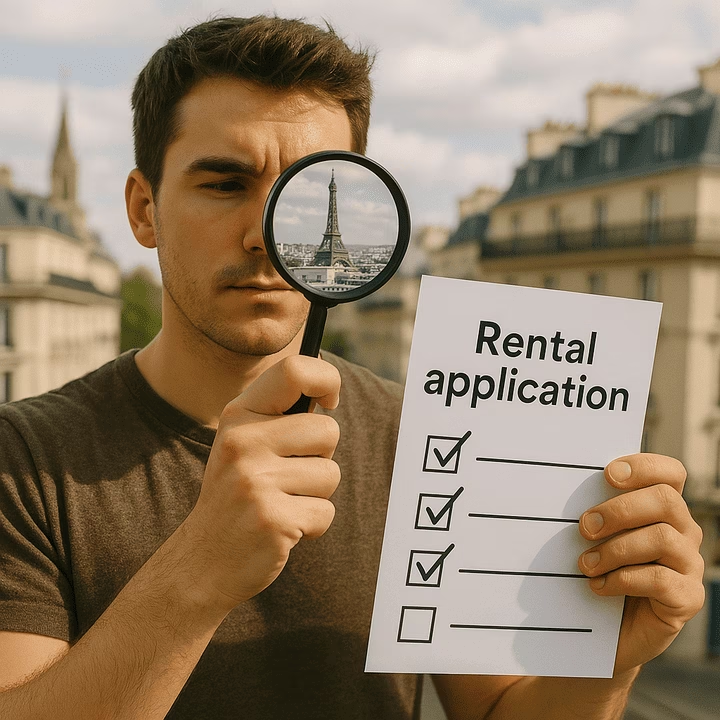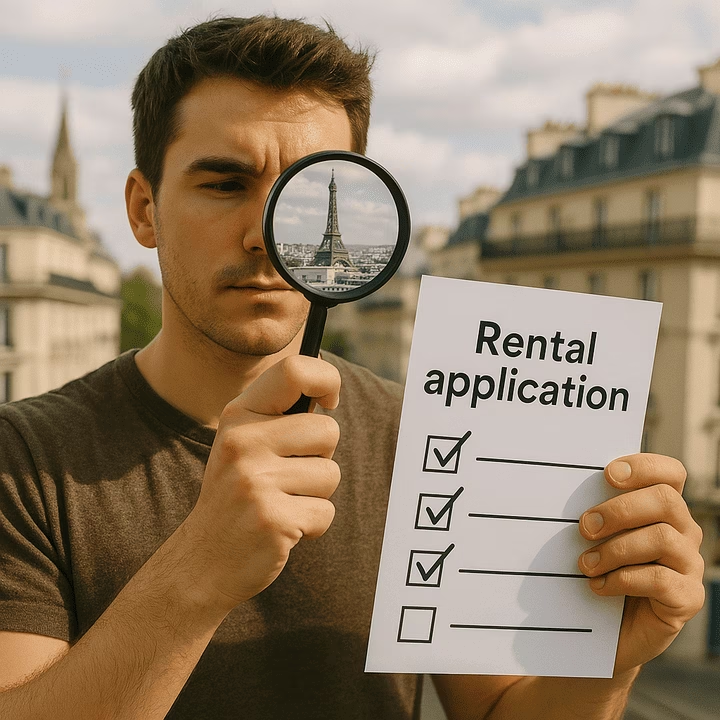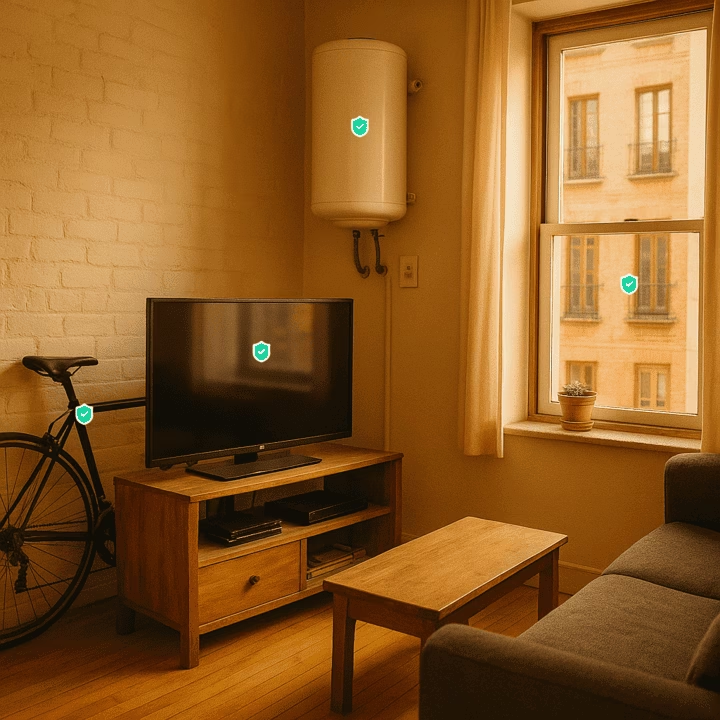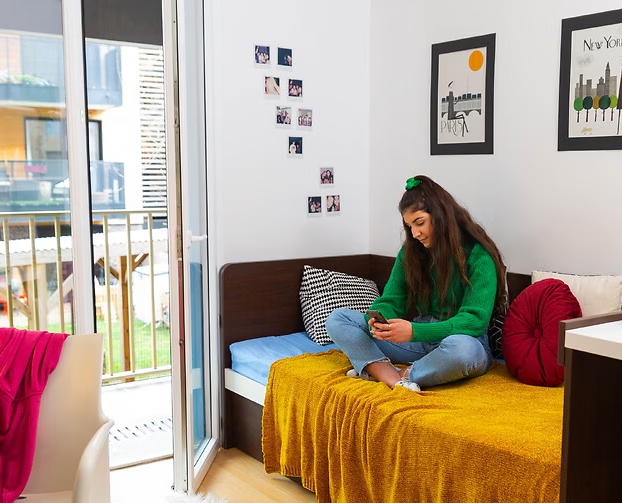🔎 Recap
No time to read everything? Here’s what you need to know about finding student housing in France!

Introduction
Finding student accommodation in France can be (very) challenging, especially in big cities. Most students search at the same time (June to September), and the best offers disappear fast!
The language barrier doesn’t help either, and we regularly receive messages from students struggling to find housing. The key is to start early and use every resource available: your school (welcome services and student associations), social media, and housing platforms.
We’ll walk you through everything you need to be aware of, like preparing your rental application, and most importantly, where to look. From CROUS residences and private student housing to homestays, rentals, and shared apartments—there are plenty of options. With a bit of luck and good organization, you should find your new home quickly! 🙌
The French Rental Market: What Housing Options Are Available for Students?
CROUS Residences: Affordable and Convenient
When searching for housing, we recommend starting with student residences. Some are private, while others are run by the French government—this is the case with CROUS residences.
CROUS residences are the go-to choice for scholarship students. With rents ranging from €150 to €450 per month, they are affordable and usually located close to campuses. The rooms are fairly basic, but they offer everything you need for your stay in France.
👉 Our tip: Places are limited, and scholarship students get priority, so apply as early as possible to maximize your chances! International students can apply for CROUS housing online from July 9 via https://trouverunlogement.lescrous.fr.
Private Student Residences: More Comfort, Higher Cost
If CROUS residences are full or if you’re looking for something more modern, private student residences (like Les Estudines or Nexity Studéa) can be a good option. These accommodations usually include WiFi, laundry facilities, and sometimes even a gym or common areas.
- Pros: Great for short stays (under 6 months). No need to buy furniture or handle many administrative tasks.
- Cons: Rent is higher, typically between €500 and €800, sometimes even more depending on the city. These residences are more expensive than CROUS housing and sometimes cost more than renting a private apartment.
Private Rentals & Shared Apartments: Independence and Community
For more independence, you can rent a private apartment or choose a shared flat. Renting on your own is usually costly, so we highly recommend shared housing. It allows you to split costs (electricity, gas, internet, and service fees) and is also a great way to meet people and fully experience life in France.
⚠️ Important: If you choose shared housing, make sure your name is on the lease. This is essential if you want to apply for housing aid (APL – Aide Personnalisée au Logement).
Coliving: A Trendy Option
If you're looking for a social, flexible, and hassle-free housing solution, coliving might be a great fit. It offers a mix of private and shared spac es, making it ideal for meeting new people, especially young professionals and international students. While not always in city centers, coliving spaces are well-connected by public transport, making it easy to explore.
Coliving is particularly convenient for short stays, as the apartments are fully furnished with included services (WiFi, cleaning, etc.), and rental contracts are more flexible than traditional leases.
📄 Note: Coliving is usually more expensive than renting a private apartment or shared flat, with rents ranging from €500 to €900 per month.
👉 Interested? Check out platforms like Colonies, Casa, or coliving.com.
Homestays: A Full Cultural Immersion
Want a complete cultural experience? Have you considered living with a host family? With rents ranging from €300 to €500 per month, you’ll get to share daily life with a French family. This option is less common (except for au pairs), but we’ve heard great feedback from those who have tried it—so it’s definitely worth considering!
Start planning your stay in France with the Student Hub 🙌

Where to Look: Housing Platforms for International Students
Lokaviz: The Official CROUS Housing Platform
Lokaviz is the official platform for CROUS housing. You’ll find all available residences in major student cities. International students can apply from July 9.
While the site is in French, you can use Google Translate to help navigate.
Le Bon Coin, Studapart, and SeLoger: The Essentials
Le Bon Coin: This is the most popular classifieds site in France, similar to Gumtree in the UK or Milanuncios in Spain. It's one of the go-to places for housing searches. Keep in mind that most ads are posted by individuals, so you’ll save on agency fees (which can range from 50% to 150% of one month’s rent in France).
- Pros: Tons of listings, super convenient, and you can filter out agency ads and the fees that come with them.
- Cons: The site is only in French, the ads are sometimes a bit basic, and there are scams. To avoid getting scammed, never pay anything before visiting the place and signing the lease (this goes for any listing, on Le Bon Coin or other sites).
Studapart: A platform specialized in student housing with verified ads. The great thing about Studapart is that it’s modern and the site is available in English.
- Pros: English-friendly, consistent listings, verified ads.
- Cons: Nothing notable.
SeLoger: A more traditional player in the market, SeLoger has a lot of listings, but, again, the site is only in French.
- Pros: Modern site, verified ads.
- Cons: Only available in French.
Appartager and La Carte des Colocs: Easier Shared Housing
La Carte des Colocs: Our top recommendation for finding shared housing! Their website is well-designed, easy to navigate, and most listings include a short description of the current tenants.
- Pros: Friendly community feel, site available in English.
- Cons: Increasing number of agency listings.
Appartager: A platform for shared housing and room rentals. A solid alternative to La Carte des Colocs, although the site is slightly outdated. Still, it has many listings and is worth checking out.
- Pros: Easy to use, dedicated to shared housing and room rentals
- Cons: Outdated website, no English version.
Facebook Groups and Social Networks: Don’t Underestimate Them
They say Facebook is dead, but when it comes to finding student housing, that’s not true! In almost every city, you’ll find one or more groups like “Logement à Toulouse” or “Logement étudiant Rennes.”
Most ads are written in French, but it’s still worth checking them out – you’ll avoid agency fees and might even find some real gems!
Our complete guide to housing in France

Preparing Your Rental Application: Key Documents
Documents You’ll Need
In France, a solid rental file is essential to convince landlords and agencies. We recommend gathering all the necessary documents before your first viewings.
Even better: print everything out and bring a complete file with you to the visits. If you find a place you love, you can immediately hand over your documents to the person showing you the property (landlord or agency), which will help you stand out from other applicants.
Here are the documents you’ll typically be asked for:
- Proof of identity: National ID card or passport.
- Proof of student status: Student card or enrollment certificate for the current year.
- Proof of income: Generally, the last three pay slips. If your income is too low, you may be asked for one or two guarantors.
- A guarantor: Your guarantor will need to provide the same documents as you (identity, professional status, and income). You can also opt for online solutions like Garantme, which specialize in assisting international students.
⚠️ Important: You’ll also need a French bank account to pay your rent, as well as most other housing-related expenses (renter's insurance, electricity, gas, internet). It's also necessary for your housing aid application.
The Importance of the Guarantor
We can’t stress this enough: having a guarantor is crucial for students, as most don’t have enough income to reassure landlords. Typically, landlords prefer French guarantors because their documents are in a familiar format and language, making the process smoother and boosting their trust.
Fortunately, there are several solutions tailored to international students.
- Visale: A free guarantee for students, subject to eligibility.
- Garantme: A paid option, but accessible to international students.
Planning Your Budget: What’s the Average Rent for a Student?
In Major Cities
Paris remains the most expensive city (800 € to 1,200 €/month for a studio), followed by Lyon, Bordeaux, and Nice (500 € to 800 €). In larger cities, consider sharing an apartment if your budget is tight.
In Smaller Cities
Rent is more affordable in cities like Nantes, Lille, or Strasbourg, especially when you move away from the city center (300 € to 500 €/month).
Practical Resources for International Students
Top 20 Student Cities in France
Check out our pages dedicated to the main student cities in France. Culture, gastronomy, cost of living, and good tips: we help you discover your host city and choose the right neighborhood to settle in.
Student Associations and Welcome Weeks
Welcome Weeks are organized by universities and student associations at the start of each school year (in September). They can be very helpful in guiding you and answering any questions you have about housing.
Conclusion
Finding housing in France is no small feat, but with good preparation, it’s totally achievable. Get your rental file ready, plan ahead (2 to 3 months before your arrival for peace of mind), and make use of the resources offered by your school. Good luck with your search! 🤞










